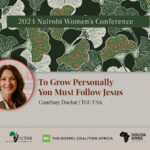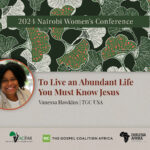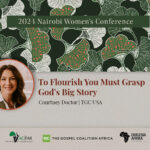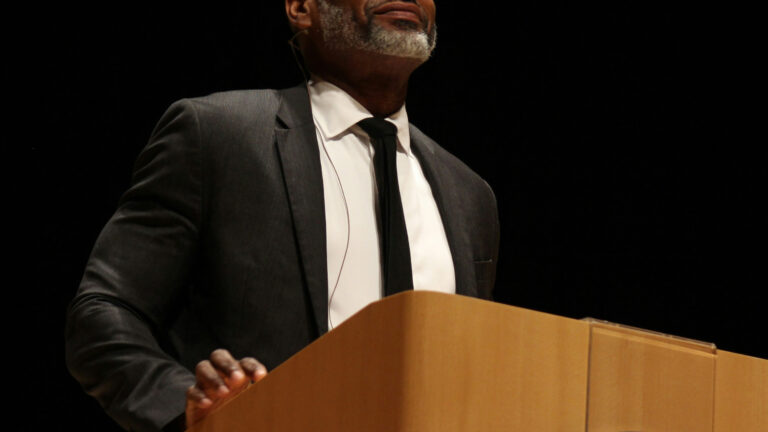Black Friday. What is it? Where does it come from? How does it end up in Africa? But most importantly, how do African Christians respond to Black Friday?
My name is Blaque Nubon and this is The Gospel Coalition Africa.
Black Friday. Now this is probably the most craziest, most anticipated day of the year. If you don’t know what Black Friday is, no judgement, but you’ve probably been living under a rock! So I’m gonna give you a summarised breakdown of what Black Friday is.
It’s essentially one day in the year when retailers put selected items on discount. Crazy sales. Crazy bargains on items such as clothing, food, fridges, microwaves, gaming consoles, cell phones and the favourite hit of Black Friday, flat screen TVs.
Now a lot of people use Black Friday for a number of reasons. Other people use it so that they can do their Christmas shopping very early, and spend the rest of the time with their family. But other people use it so that they can fill up their houses with more stuff that they actually don’t want. But other people use Black Friday to get essential household items that they couldn’t afford throughout the year. But now that the prices are reduced, they go in and get some of those items.
I didn’t even mention the crazy lines that are formed on Black Friday. I didn’t mention the climbing over of each other. The pushing, the shoving, all the screaming… Personally I haven’t been to any Black Friday, but I’ve seen the videos, the memes, the pictures, and I am cool on this side! And I’ll just watch all the action happening on the other side.
But we didn’t just get here. Let’s go back to the origins of where Black Friday comes from.
So, according to Ben Zimmer who is the language columnist who writes for the Wall Street Journal, he says that the term Black Friday was originally used to describe negative events that fell on a Friday. For example, like the events of 1869, the 24th of September, when two investors, namely James Fisk and J Gould bought a whole lot of gold to try and corner the gold market. But they didn’t realise that that’s gonna create a financial panic – and it was bad for the market. And that day was known as Black Friday.
But fast forward to the year 1951 in the Trade Journal, an entry titled Factory Management and Maintenance, written by Bonnie Taylor Blake, where it speaks about how workers were absent on the Friday after Thanksgiving. Again, if you didn’t know, Thanksgiving in the United States happens on the last Thursday of November. On Friday, people are still required to go to work. But these workers would not show up. Presumably because they’ve had ‘nice times’ on Thanksgiving on that Thursday. So Friday they were absent from work, and the employers then called that day Black Friday.
So yes, that might have been the original use, but how did it end up being the day when people are shopping for stuff?
Well, according to various resources, and they all agree, that the term Black Friday – or the day Black Friday as we use it today – was coined by the cops in Philadelphia. So if Thanksgiving happens on the last Thursday of November, what would happen is the Saturday after the Thanksgiving there would be an Army Navy Football game that attracted thousands and thousands of people to the city of Philadelphia. And when would they arrive? Well they would arrive on the Friday so that they could prepare themselves to go to the games on Saturday.
And so the cops in Philadelphia termed this Friday, Black Friday. Because if there’s more foot traffic, more car traffic, that means there’s more crimes. More things would be happening with more people all concentrated in one city. And so the cops did not like that day and they termed it Black Friday.
So retailers saw this happening and they decided to capitalise on this. Because there’s thousands and thousands of people who come into the city, they decided to drop down their prices on selected items so that they can make profits on that one day. And the tradition continued. So much so, that the retailers did not want the negative connotations attached to the term Black Friday. So they decided to change it to ‘Big Friday.’ But Big Friday just did not catch any waves with anybody, and so they resorted back to Black Friday.
But fast forward to the 1980s as retailers are still trying to fight the negative connotations attached to the name Black Friday, they came up with a narrative to say that businesses are normally in the red – meaning that they are in debt. But when a business is in the black, then the business is doing well and it’s profitable. So they said the term Black Friday means that the businesses are in the black – which was factually correct. Because they made crazy amounts of money just on that one day. And people have kept the term Black Friday for years and we still use it ’til today.
A common myth about Black Friday that was started by an internet meme in 2014, that said that Black Friday was actually originally in the 1700’s a day that was used by slave owners to sell slaves at a discounted price. Again that was disproved by the truth that the term Black Friday was first used in the year 1869 to describe negative events that will fall on a Friday. And so the assumption that it was used in the 1700’s just has no basis.
So how did it get to Africa?
Well, according to EWN, in South Africa a CEO of one of the biggest online shopping platforms, said that in 2011, they wanted to be in the black as the year was ending. And they were thinking of ideas of how they can make profits. Well as they were brainstorming, somebody suggested the idea of Black Friday as it’s seen and done in America. And so the CEO says that they adopted the idea. And in the first year, which was 2011, on Black Friday this online shopping platform made a turnover of a million rand in just that one day.
Fast forward to 2019 and this same big online shopping platform has made a turnover of R196 Million just on Black Friday.
In fact one of our biggest banks in South Africa records that in 2018 when they count all the transactions of their customers, they amounted to R2.5 Billion.
In Nigeria, one of the biggest online shopping platforms says that on Black Friday alone, when they started adopting the trend in 2014, they have over 150 Million visits. And therefore, they’ve extended Black Friday to the whole month of November because of the amount of money that they make with the idea and concept of Black Friday.
So with all of that said, how are African Christians supposed to respond to Black Friday?
Well we start where we always start. With how the gospel is supposed to influence and shape our hearts. If you’re struggling with greed, with covetousness, with the lust of material things, maybe participating in Black Friday is not the wisest way you can worship the God who financially blesses you, to take care of your needs, and that through you, he can grow his kingdom through the finances that he gives you.
If you’re tempted to blow your savings, if you’re tempted to incur debt, if you’re tempted to disregard the truth that we are in economically uncertain times, again, this is probably not a wise way to worship the God who financially blesses you.
On the other hand, as you take the gospel and truthfully let it do it’s work in your heart, you realise that you might not be struggling with any of these things I’ve mentioned. And you genuinely want to participate in Black Friday because you want to be a good steward of your time that God has given you throughout the festive season. And so you wanna do all your shopping now so that you can spend the rest of your time with your family.
You might be wanting to get gifts for your loved ones and people you are in significant relationships with. And so you know that you can get a bargain on many items for the many people in your life. Or you know that you have to be a good steward of the money that God has blessed you with. And so you wanna buy good quality items that will last you for long – so that you don’t have to keep on buying the same thing if it breaks over and over again. Or you have to keep fixing it. For example a microwave or a fridge. And so you wait for Black Friday so that you can replace your old fridge with a good quality new fridge so that you can save money in the years to come.
Or for most of us, like myself who has never participated on Black Friday, but I realise now that there’s a lot of retail workers – this year especially with the pandemic – who have lost their jobs. Or who might even be on the brink of losing their jobs. But Black Friday will obviously get a lot of profits for retailers. And these people who might lose their jobs, might be able to keep them.
So in one sense it doesn’t matter which side of the fence you fall on. Whether you participate in Black Friday or you don’t participate in Black Friday. Whether you think Black Friday is the most amazing thing to happen or you think Black Friday is the worst thing to ever happen!
I think we should use Black Friday like any other day, as a reminder of the grand, beautiful, majestic story that God is telling of how He’s redeeming the world back to Himself. In fact, in an article Paul Tripp wrote last year in 2019, he titled it ‘The Original Black Friday.’ He speaks about how the most horrible to happen in the world, God used it as the most beautiful thing in the history of the universe.
When Jesus Christ was crucified on the cross, outside the city on a hill. And in fact in Matthew 27:45 (and I paraphrase) it says that from the 6th hour right up until the 9th hour the whole land was covered in blackness. The original black Friday gives us freedom. So that we don’t have to continue buying and searching for saviours on the shelves of any store that we can go into on Black Friday. But at the same time it frees us, as well, to be good stewards; to make sure that we use the resources that God has given us, for the sake of taking care of our families, those around us, and the world that God has entrusted us with – as He builds His kingdom through the resources that God gives us.
So we can be free to worship God and know that we don’t have to worship material things. We can be free to worship God and use material things in the right and proper context that will also give glory and worship to God.
So as Black Friday is upon us, I would urge you to go back again to this beautiful story of the gospel. How God redeems the world to himself through Christ. And see how that informs your life as we approach this Christmas season. A time when we are supposed to remember the birth of Jesus – the reason why he came – and that was to die for sinners like you and I. That was to sacrifice himself, so that we may have life in him, and have it abundantly and eternally. And in our response and worship to him, we sacrifice all that he’s given us, for his glory.
So here’s how it might look like. I think it’s important, and essential, that we are marked and known by our sacrifice and our giving. Especially in times of crisis.
So instead of hoarding things for ourselves this Black Friday, I think it’s important that we get our family – or even our church community – to come together. Utilise all our resources so that we can use and capitalise on Black Friday to get essential things such as food and clothing for those who are less fortunate than us.
If we would normally give 50 items, Black Friday affords us an opportunity to give 100 or even 200 more items.
So let us come together as believers, as those who know what Jesus has done for us on the cross, as we enter into this season of remembering him and why he came; so that he could sacrifice himself for us. Let us do likewise to those who are around us, our neighbours, as we love God with all our strength, mind and soul. And so we love our neighbours as we would love ourselves. So let us use and capitalise Black Friday for the sake of giving. For the sake of sacrificing ourselves.














